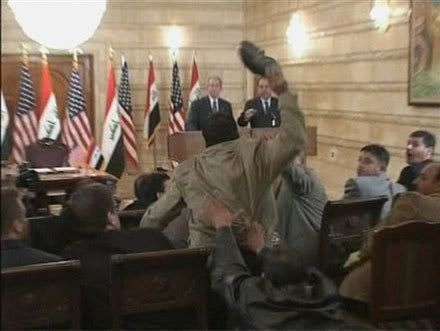
Sixty years ago, U.S. Supreme Court Justice Robert Jackson left Washington to pursue what he later called "the most important, enduring, and constructive work of [his] life": prosecuting international war crimes committed during WWII. Justice Jackson helped usher in a new international regime that promised to help deter human rights abuses.
Unfortunately, Jackson's achievements have proven less enduring than he hoped. Our nation continues to undermine international law by sweeping torture under the rug, with serious implications going forward.
The Nuremberg Trials established a timeless principle: individuals are criminally liable for violating fundamental human rights, even if their governments authorized those violations. Some laws, Nuremberg held, transcend those of any nation.
We have fallen a long way in so short a time. Rather than enforce international principles we once pioneered by prosecuting former officials who enabled torture, our nation today violates those principles with impunity.
President Obama's focus on the future aims to transcend the political divisions deepened by his predecessors. But setting aside the past comes at a price.
Most concretely, failing to prosecute taints the debate on other "war on terror" policies. Preventive detention schemes, infiltrations of law-abiding groups based on constitutionally protected speech or religious activities, and secret warrantless surveillance programs each entail severe threats to the Constitution. They demand public debate.
But these debates have been skewed by the inclusion of former officials who, because they remain free from investigation, also remain free to champion their discredited policies in public. Former Vice President Dick Cheney, for example, vigorously defends the Bush administration's detention policy, despite clear evidence that torture hurt America in more ways than one.
Torture harmed our international relations with even allies like Britain, which curtailed cooperation with the CIA because of inhumane detainee treatment. Moreover, as the U.S. Air Force Major whose interrogations found the leader of Al-Qaeda in Iraq has written, "Torture and abuse became Al Qaida's number one recruiting tool and cost us American lives." Criminal prosecution would place the arguments of Bush administration apologists in the context they deserve.
Other costs of avoiding prosecution are less concrete but equally severe. For instance, failing to prosecute, by definition, erodes the rule of law. Law entails the consistent application of neutral principles across differing contexts. Yet our nation tolerates vast inequalities in prosecution. Between 2006 and 2007, over 320,000 Americans received prison sentences for non-violent offenses. In sharp contrast, among the senior officials responsible for authorizing torture, none have faced even a criminal investigation -- let alone charges, prosecution or a sentence.
Hundreds of lawyers across the country recently wrote the Attorney General and Congress to explain how this unequal justice undermines the legitimacy of our legal system. They wrote, "The severity of systemic disadvantages in the criminal process grows more disturbing -- and the system's legitimacy grows less secure -- when violations of our nation's most fundamental commitments carry no consequences for potential criminals who wield political influence."
Lawyers are not the only ones challenged by this bias. Nearly 500 teachers also raised their voices, noting how lawlessness impacts students: "We teach principles about our nation's history, founding, and governance that appear simply implausible...[T]he preferential treatment of senior officials who commit heinous crimes-relative to the school-to-prison pipeline that ensnares many of their peers for relatively innocuous misbehavior-does not escape [our students'] attention."
Thousands of other concerned Americans from all 50 states, including hundreds of health professionals and interfaith religious leaders, have also observed that our country's future ability to promote human rights elsewhere turns on whether we do so here at home today. We at the Bill of Rights Defense Committee invite other concerned Americans to join their call.
The Bush administration's assault on the rule of law helped propel President Obama into office. Rather than fulfilling his politically daunting campaign promises, however, the administration has chosen expediency over equal enforcement of the law.
The President himself has suggested time and again that it is ultimately up to "We the People" to defend our interests. The struggle to restore rule of law is one we will win, but only with the passionate participation of every concerned American.
Reposted from Huffington Post. An earlier version of this article appeared in The August Free Press as an op-ed on June 27.
 Earlier this summer, when facing a crucial accountability moment for an agency that continues to abuse the rights of millions of Americans, members of Congress asked no tough questions, avoided controversy, and submitted to a White House proposal to entrench the FBI leadership—at the same time as they fought to the knuckles over issues that Congress created in the first place by spending the country into a fiscal black hole and absurdly cutting taxes in the midst of multiple wars.
Earlier this summer, when facing a crucial accountability moment for an agency that continues to abuse the rights of millions of Americans, members of Congress asked no tough questions, avoided controversy, and submitted to a White House proposal to entrench the FBI leadership—at the same time as they fought to the knuckles over issues that Congress created in the first place by spending the country into a fiscal black hole and absurdly cutting taxes in the midst of multiple wars.








